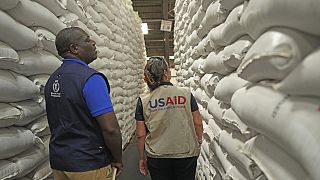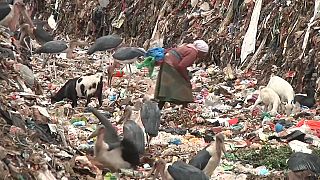Kenya
Sprawling over some 30 acres, the Dandora dump is one of the widest open-air dump site of eastern Africa.
The site sits outside of Kenya's capital and welcome most of the city's solid waste.
In the midst of plastic, glass and other wastes, food can also be scavanged.
Waste picker Anne Wangui earns about $3 a day.
"We scavenge the food that comes here and sell it to pig farmers. Per day, I can make around Ksh 300 ($3) and am grateful because I am able to pay my rent and educate and feed my kids. The food waste should continue coming here because without it we won't have work."
If poverty and lack of economic prospects push thousands of residents into the scavanging business, food waste and failure in management of the fill is a food and environmental problem.
The environmental toll of production, including the land and water required to raise crops and animals and the greenhouse gas emissions it produces, including methane, a powerful gas that has accounted for about 30 percent of global warming since pre-industrial times.
Transforming food systems
According to a recent United Nations report, the world wasted about 1.05 billion tons of the food it produced in 2022.
This represents about 19% of the food produced globally that year.
The report is co-authored by the United Nations Environment Programme’s (UNEP) and Waste and Resources Action Programme (WRAP), an international charity.
The head of Kenya's Nutrition society believes the issue should be addressed from the farm to the table.
"Food waste is a critical component that has to be addressed for any nation around the world to be able to achieve food and nutrition security," Henry Ng'ethe says.
"This is something that has to be addressed from the farmers because statistics have shown that around 811 million people go hungry because of lack of food. A third of the food that is produced around the world goes to waste because of various other losses in the food systems."
James Lomax, a programme Manager at the agency recommends acting on food systems to efficently tackle food waste.
"Despite the fact that food waste has been on the top of the global agenda for quite a few years now, it has its own sustainable development target and that has been in place since 2015. So that is 9 years that countries have had a real target to have food waste, little progress is being made actually."
"There needs to be a really concerted effort when it comes to of course dealing with food waste. Because food waste in some way is a symptom of an unsustainable food system"
"By ensuring that we have better food to eat by ensuring that there is more value in the food that we eat, by ensuring that the food system is more efficient. Then I think, by doing that food waste will be reduced."
Food waste is an increasing concern in Kenya, where an estimated 4.9 million tons of food is squandered every year.













02:34
Initiative in Nairobi's Mukuru slums uses fly lavae to tackle food waste
01:24
Haiti's crisis: a focus on security fragility and humanitarian needs
01:17
Gachagua-Kindiki: Courts to settle Kenya's DP dilemma
Go to video
Kenya: Impeached DP Gachagua alleges attempts on his life, calls Ruto “vicious”
01:31
Seven-story block collapses in northern Nairobi, tenants of adjacent buildings evacuated
01:26
Kenya: High Court issues order halting replacement of Rigathi Gachagua as DP